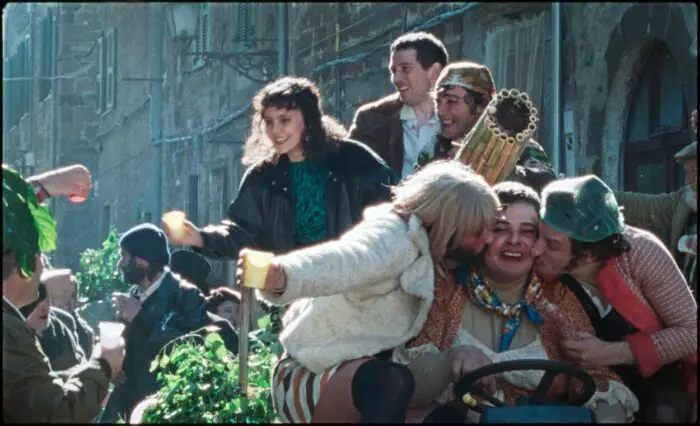When it premiered at last year’s Cannes Film Festival, La Chimera was met with as much adulation as any other film there screened, and yet when the Jury failed to select it for any of the top prizes, that wave of acclaim it was acrest of seemed to disperse and it fell by the wayside next to films like Anatomy of a Fall or Killers of the Flower Moon, and with a release so unhurried, I fear this film’s merits were largely forgotten in the months that followed. Yet, I was there and I remember when this was the festival’s hottest ticket and it has remained as one of those movies I had to jump onto the first chance I got. Having now seen it, I can understand both why it was so acclaimed, but also why a Jury couldn’t manage to agree on its merits, especially against such strong competition. Those familiar with director Alice Rohrwacher’s other features may have some idea what to expect, but even so, this might ultimately frustrate more viewers than it enchants.
The film opens with Arthur (rising star Josh O’Connor, showing his quality in a second language role) a down-at-heel Englishman who’s had a falling out with his crew of ne’er-do-wells in whose company his sixth sense for dowsing his way to buried Etruscan offerings just about keeps him liquid. But Arthur’s lost and confused having misplaced his great love Beniamina (Yle Vianello) who still haunts his dreams, so he continues mooning about at her mother Flora’s (Isabelle Rossellini), where she meets Italia (Carol Duarte) a good-hearted but absent minded beauty, ostensibly a student of Flora’s but in actuality more of a squatter/maid.
There’s a deep sentimentality, curiosity and affection for the characters and milieu being presented, and you may be in for a very slow 133 minutes if you’re not able to get on board with that. At times, it feels as if La Chimera is all setup. It’s over an hour in before it feels like we’re done establishing characters, mood and backstory and the plot, that which it has, can begin. It’s no sort of adventure. The clandestine archaeology Arthur and his motley crew perform is less Indiana Jones and more The Detectorists; finding valuable pieces in long buried tombs beneath fields and junkyards under cover of night and selling them on to an anonymous fence whose inhuman contempt for them is palpable. The grandeur of the past is less faded and more dilapidated.

La Chimera embodies a hazy, ethereal tone, but also a tongue-in-cheek comic one as well, especially in the first half. With fast motion sequences and fourth wall breaks that evoke silent comedies, the whole film presented through the vignetted lens of an old film camera that does as much to express the film’s period setting as anything onscreen. With Happy as Lazzaro, Rohrwacher created a rural past as a living present, and here too, the slippage between the two is fragile. The film romanticizes a lost past as an era of freedom, while reviling its blasphemous plundering for modern profits.
There are some wonderful supporting performances from the likes of Rossellini and Duarte, but at the film’s center is O’Connor, whose familiar boyish smile is rarely seen in a role racked by malaise and rancor. Her last film was Happy as Lazzaro, this should’ve been called “Miserable as Arthur”, and where Lazzaro was saintly, Arthur is all too human. He knows what he’s searching for less than we do, pushing away those few who accept him and unable to make himself content with what happiness does come his way. It’s Beniamina who visits him in his dreams, and who ultimately represents all that is missing in his life, but the only place he can search for her is in the past: in the graves of those long buried that often resemble moldy subterranean bedrooms more than tombs. Some things are not there to be taken, and others are, and Italia alone knows the difference. When she finds an abandoned railway station, she asks whose it is: “does it belong to no-one or to everyone?”.
La Chimera is a poignant and frequently enchanting film. Its carnivalesque playfulness and gentle warmth are endearing, and I hugely respect and endorse the heady, literate and sensitive goals to which it aspires. However, I once again feel there’s something slightly missing, one perfectly articulate moment that would bring these disparate ideas and emotions to a satisfying close. Maybe it’s a little too overt with its symbolism, but at times it can definitely be too obtuse as well. The languid pace will bother many, as will the bittersweet ending that doesn’t feel quite right to me. It’s a bit too rushed and simple in its tragedy, a cautionary tale for those who would dwell too long on past recriminations and lost happiness. The film gives us these moments of ecstatic freedom and then Arthur withdraws from them, the bloody fool.
Perhaps, I’ll warm to La Chimera in time. I can feel I’m talking myself into liking it more as I’m writing, and I know that dissatisfaction is the point, but I might’ve hoped for a little more…je ne sais quoi? Puissance? There are some audacious moments along the way though, including one of the best hidden cut tricks I’ve ever seen and some exquisite little flexes that show you what a phenomenal and imaginative eye Rohrwacher has. This might not have been the story I’d have chosen to express these ideas, but it serves all the same I think.




